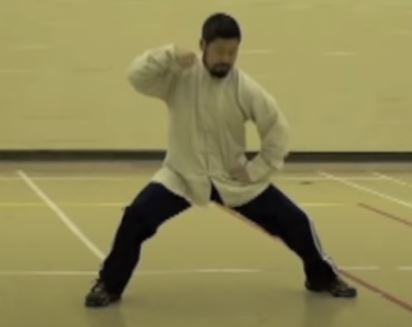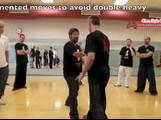Driving through the immense rural landscape of China by car during a recent research trip my teacher, Chen Zhonghua, and I sought diversion from the lengthy journey by entertaining each other with stories. As we were traveling from the city of Jinan to Chen village (Chenjiagou) we happened to pass Handan, a little hamlet tucked in amidst the fertile fields of central Shandong province. There is a story associated with Handan, one which is apparently so well known that you only have to mention Handan for people to knowingly smile and nod. This story does not relate specifically to Taiji, but the point of the story is most pertinent to how we practice.
Many centuries ago Handan villagers were known for their beautiful walk. Their method of walking was so elegant that even if a person was not beautiful their walk made them seem so. Everyone that saw it agreed that this was the most graceful walk they had ever seen and of course everyone wanted to be able to walk that way so that they could also be more beautiful. One very poor village some distance away from Handan was so envious of this skill that the locals pooled their money together and convinced the most handsome young man of the village to accept the money and travel to Handan to learn this way of walking. When he returned he would in turn teach everyone in his village what he had learned.
As they gave him the money they said, “We’re not sure how much the tuition will be or what your living expenses will be but we hope this is enough for you to learn their full art. Please work hard and pay us back by teaching us what is taught to you.”
The young man left that day and, as quickly as he could, made his way to Handan to begin his studies.
After several months had passed the people from his village began thinking that he should be returning soon. After all how long can it take simply to learn a new method of walking? They began scanning the rough dirt road that lead into their village many times every day with great anticipation.
Several weeks later, one of the villagers spied a curious thing. There seemed to be a man, far in the distance, crawling down the road towards them. Looking harder they could see that it was the handsome young man they had sent to Handan village.
The villagers rushed down the road to greet him and to see what had happened. “What has happened to you?” they all shouted at once. “Why are you crawling? Are you hurt? What happened to you in that village?”
They picked him up and carried him to the residence of their village headman. There they sat him in a chair and brought tea and warm soy milk to refresh him. When he was recovered and his cuts bandaged he finally managed to speak.
“Handan is a fantastic place and the people there are wonderful. They taught me as though I was one of their own and taught me as quickly as possible. But they told me when I arrived that before I could possibly learn their way of walking I would have to give up my old way. I worked hard for the sake of our village and every day I trained to forget the old method. I stayed long enough and worked hard enough that I succeeded in forgetting the old way of walking, unfortunately I didn’t have enough money to learn the new way.”
This story from the classics of China resonates for many Taiji people as we also have to give up our old way of moving. From birth we have been taught to move and power our bodies through the use of muscle. Taiji turns that idea upside down and encourages people to find a new, Taiji way of moving. Taiji’s method of moving and powering the body is more based on joint rotation and alignment than it is on muscle. The serious study of Taiji involves a long, gradual process of letting go of one’s old muscle-based method of moving and gradually integrating this new way of movement.
For people who are used to feeling strong and powerful it is very difficult to give up that strength and control and, for a period of time, have no power. Figuratively speaking, we also feel that, during this period, we are only capable of crawling.
Chen Zhonghua has been quoted as saying that “for five years it is like you are in a room and the lights are out. You cannot see anything.”
Through persistence, correct teaching and hard work we can find this new method and in the end will be healthier and stronger for our efforts.
Gordon Muir
edited by Todd Elihu


